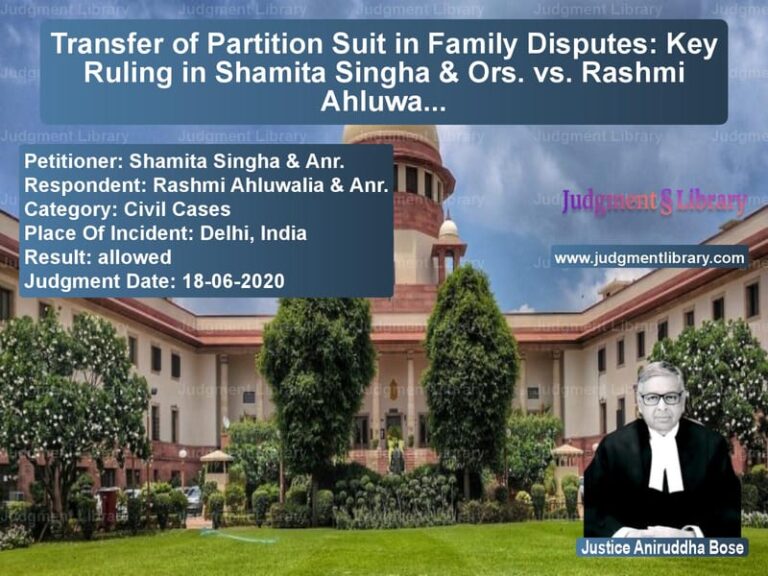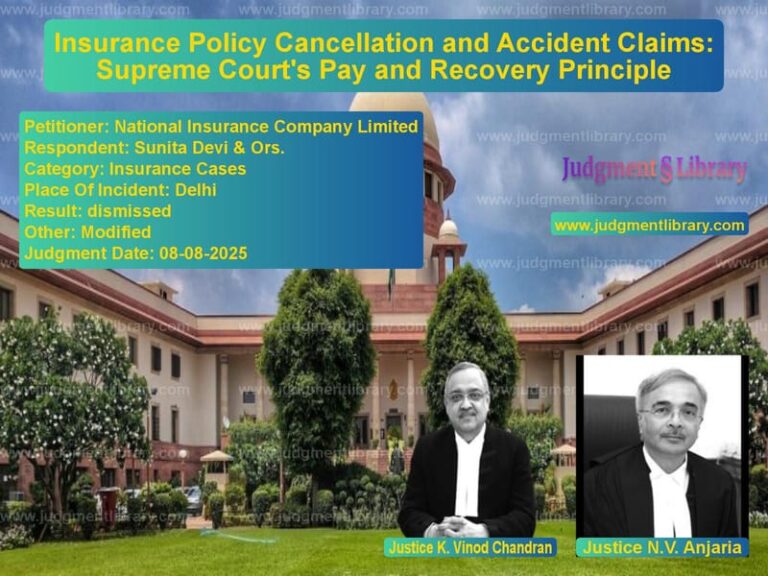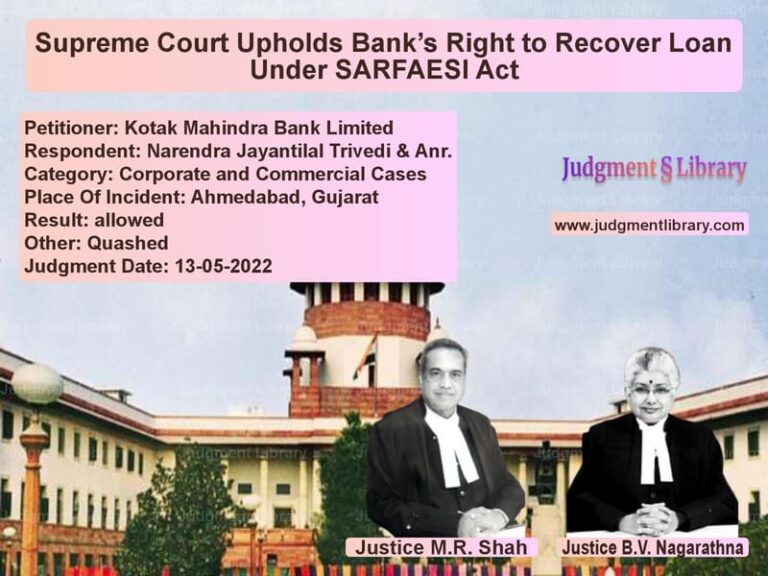State Bank of India vs. M.J. James: Supreme Court Verdict on Disciplinary Proceedings and Employee Rights
The case between the Chairman, State Bank of India, and M.J. James highlights crucial aspects of disciplinary proceedings in the banking sector. The respondent, M.J. James, was a former manager at the Quilon branch of the Bank of Cochin. The dispute arose from allegations of financial misconduct that led to his dismissal from service. After a prolonged legal battle, the Supreme Court ruled in favor of the State Bank of India, setting aside the Kerala High Court’s decision that had earlier quashed the disciplinary action.
The judgment is significant as it clarifies the principles of natural justice in employment-related inquiries and reinforces the importance of adhering to internal service codes while conducting disciplinary proceedings.
Background of the Case
In 1984, M.J. James was issued a memorandum of charges while serving as the branch manager of the Quilon branch of the Bank of Cochin. He was accused of granting advances in violation of the Head Office’s instructions, resulting in financial losses for the bank. The primary allegations included unauthorized sanctioning of credit, exceeding discretionary powers, and not obtaining proper approvals from the Head Office.
The respondent refuted these allegations, arguing that his actions were aligned with oral instructions from senior management, including the then Chairman of the Bank of Cochin. He claimed that he was under the impression that the approvals would be ratified later by the bank’s Board. The bank, however, rejected his defense and initiated disciplinary proceedings against him.
Disciplinary Proceedings
An inquiry was conducted, and Mr. C.T. Joseph, an advocate, was appointed as the inquiry officer. The respondent requested to be defended by Mr. F.B. Chrysostom, an office-bearer of the All-India Confederation of Bank Officers Organisation, Kerala Unit. However, this request was denied on the ground that Clause 22(ix)(a) of the Service Code only permitted representation by a registered union or association of the Bank of Cochin, not by external associations.
The inquiry proceeded despite the respondent’s objections. The presenting officer, Mr. Jimmy John, led the bank’s case against the respondent. The inquiry officer found that M.J. James had exceeded his discretionary authority, sanctioned unauthorized advances, and violated banking regulations. Based on these findings, he was dismissed from service in April 1985.
Legal Challenge and High Court’s Ruling
Following his dismissal, M.J. James filed an appeal with the State Bank of India’s Chief General Manager in Chennai in 1989, nearly four years after the disciplinary action. The appeal remained pending for nine years, during which the respondent did not actively pursue it. In 1998, he approached the Kerala High Court through O.P. No. 19807/1998, seeking a direction for the disposal of his appeal. The High Court granted the direction, and the appeal was subsequently rejected in 1999.
Unhappy with the outcome, M.J. James filed another petition (O.P. No. 5527 of 1999) before the Kerala High Court, challenging the decision of the disciplinary authority and seeking reinstatement with full back wages. The Single Judge ruled in his favor, quashing the disciplinary proceedings on the ground that the denial of representation by an external union official amounted to a violation of natural justice. The bank appealed against this ruling, but the Division Bench of the High Court upheld the Single Judge’s decision, leading the bank to challenge the verdict before the Supreme Court.
Supreme Court’s Observations
The Supreme Court analyzed the key provisions of the Service Code and the principles of natural justice. The primary issue before the Court was whether the denial of representation by an external union official constituted a breach of natural justice.
The Court observed:
- Clause 22(ix)(a) of the Service Code explicitly defined representation rights. It allowed an employee to be defended by a representative of a registered union or association of bank employees, but the definition of ‘bank’ under Clause 2(e) referred specifically to the Bank of Cochin, not other banks.
- The omission of the article ‘the’ before ‘bank employees’ in Clause 22(ix)(a) did not justify broadening its interpretation to include unions of other banks.
- The respondent had the option of choosing a representative from within the Bank of Cochin but failed to do so. His refusal to participate in the inquiry and demand for an external representative did not constitute a denial of natural justice.
- The delay of over four years in filing the appeal indicated acquiescence, suggesting that the respondent had accepted the disciplinary action.
The Supreme Court emphasized that procedural fairness does not equate to an absolute right to be represented by an outsider. It reiterated that while principles of natural justice must be observed, they do not override the internal rules and policies governing employee representation in disciplinary proceedings.
Final Judgment
The Supreme Court ruled in favor of the State Bank of India, setting aside the Kerala High Court’s judgment. It upheld the validity of the disciplinary proceedings and reaffirmed the respondent’s dismissal.
Furthermore, the Court directed that any financial benefits received by the respondent due to the High Court’s ruling be returned. It provided a six-week timeline for restitution, failing which interest would be levied.
Implications of the Judgment
This ruling carries significant implications for employment law and disciplinary proceedings:
- It underscores the importance of adhering to internal service codes while conducting inquiries.
- It clarifies that representation rights must align with organizational policies and cannot be extended beyond what is explicitly permitted.
- It reaffirms that delay in challenging disciplinary actions can amount to acquiescence, weakening an employee’s legal standing.
- It establishes that a mere procedural lapse, if it does not cause substantive prejudice, does not automatically invalidate disciplinary proceedings.
The Supreme Court’s ruling ensures that disciplinary mechanisms within public sector banks remain robust and that employees adhere to established procedures while defending themselves.
Petitioner Name: The Chairman, State Bank of India.Respondent Name: M.J. James.Judgment By: Justice L. Nageswara Rao, Justice Sanjiv Khanna.Place Of Incident: Bank of Cochin, Kerala.Judgment Date: 16-11-2021.
Don’t miss out on the full details! Download the complete judgment in PDF format below and gain valuable insights instantly!
Download Judgment: the-chairman,-state-vs-m.j.-james-supreme-court-of-india-judgment-dated-16-11-2021.pdf
Directly Download Judgment: Directly download this Judgment
See all petitions in Disciplinary Proceedings
See all petitions in Public Sector Employees
See all petitions in Termination Cases
See all petitions in Judgment by L. Nageswara Rao
See all petitions in Judgment by Sanjiv Khanna
See all petitions in allowed
See all petitions in Quashed
See all petitions in supreme court of India judgments November 2021
See all petitions in 2021 judgments
See all posts in Service Matters Category
See all allowed petitions in Service Matters Category
See all Dismissed petitions in Service Matters Category
See all partially allowed petitions in Service Matters Category







